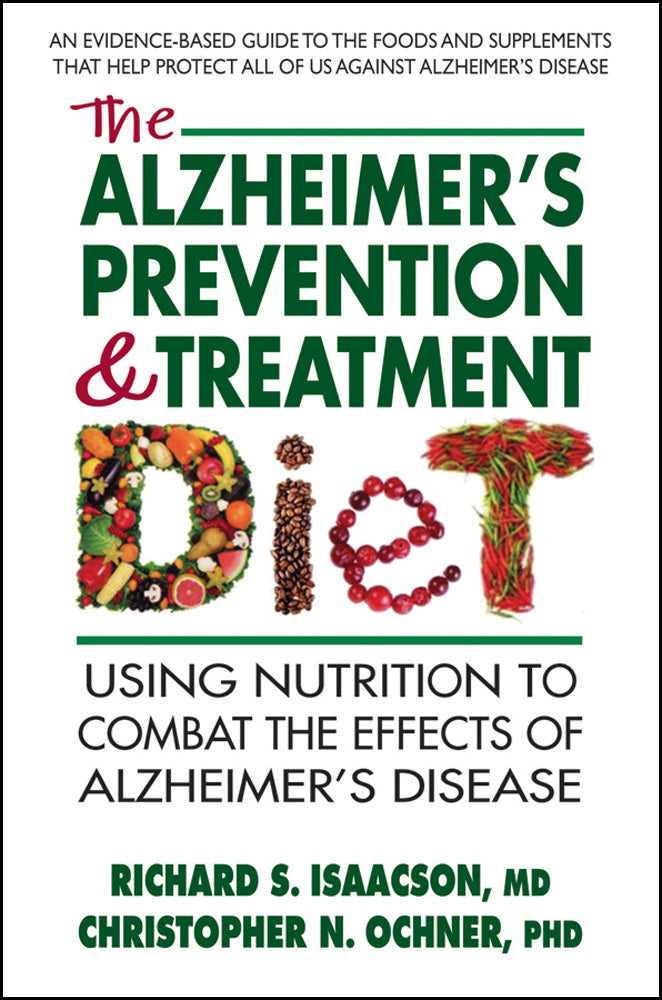*** OVER 13,000 COPIES SOLD ***
SEEN NATIONWIDE ON THE DR. OZ SHOW
Increasingly,
research has shown that diet is one of the greatest weapons we have to protect
and defend your rain against Alzheimer’s disease (AD). Based on current
studies as well as firsthand experience working with thousands of patients—both
those who have normal cognitive health and those in the early stages of Alzheimer’s—The Alzheimer’s Prevention &
Treatment Diet provides a cutting-edge nutritional program that can
help reduce the risk for AD and may slow its progress if it has already
developed.
This
book:
* Presents a nine-week diet plan that
gradually introduces brain-healthy foods and dietary strategies.
* Guides you in making smart lifestyle choices, from exercise to hobbies, that strengthen
cognitive health.
* Explores nutritional supplements that can support the brain and prevent cognitive
decline.
* Offers suggestions for
managing the special nutritional needs of loved ones with AD.
* Explains the medications used to treat AD—what they are, what they do, and
how they should be used.
* Provides sample full-day menus, including breakfast, lunch, dinner, and
snacks.
* Presents lists of recommended foods to make meal planning easy.
Whatever your age, now is the perfect time to start adopting a brain-healthy
lifestyle. The
Alzheimer’s Prevention and Treatment Diet guides you in making changes that can significantly enhance
your cognitive well-being—now and for a lifetime.
Richard S. Isaacson, MD, received his bachelor’s and medical degrees from the University of Missouri—Kansas City School of Medicine, and completed his residency in Neurology at Beth Israel Deaconess Medical Center/Harvard Medical School. Dr. Isaacson specializes exclusively in Alzheimer’s disease risk reduction and treatment, and is the founder and director of the Alzheimer’s Prevention Clinic at Weill Cornell Medicine and New York-Presbyterian.
Christopher
N. Ochner, PhD, completed
two master’s degrees in Psychology, a master’s in Biostatistics at Columbia University
in New York, and a PhD in Clinical Psychology at Drexel University in Philadelphia.
He is now President of the Nutrition Science Initiative, a nonprofit
organization that facilitates research in nutrition.
Acknowledgments
Preface
Introduction
1. Understanding Alzheimer’s Disease
2. Why Does Diet Matter?
3. The Elements of Nutrition
4. Diets That Improve Brain Health
5. The APT Diet
6. Other Strategies for AD Prevention
7. Managing the Challenges of AD Dementia
Conclusion
Glossary
Resources
Nutrition and Activity Logs
Bibliography
About the Authors
Index
"[A] comprehensive yet easy-to-follow nutritional guide for the prevention and treatment of Alzheimer's disease . . . [the authors] provide realistic and straightforward guidance . . . [they] take the guesswork out of creating a healthy and appealing diet by providing lists of recommended food and supplements, serving sizes, and weekly menu ideas. This book is recommended for anyone who cares about long-term mental health."
"[E]ven skeptics who question whether diet can truly prevent dementia will find it tough to object to this guide . . . [the authors] make a compelling case for staying slim, noting that overweight people are considered to be at greater risk of developing hypertension, high cholesterol, diabetes, and cancer . . . may reduce the risk of getting this irreversible, memory-destroying brain disorder."
The Alzheimer’s epidemic may be the greatest public health crisis facing our world today. There are over 5 million Americans with Alzheimer’s disease (AD), and millions more are affected throughout Canada, Europe, Australia, and the rest of the world. One out of nine people age sixty-five and over has dementia, and over a third of individuals over the age of eighty-five have AD. The increasing prevalence of Alzheimer’s disease is due in part to the advancing age of our population. Advancing age is the primary risk factor for AD, and with more and more baby boomers turning sixty-five every year, the number of AD cases is projected to more than triple by the year 2050!
But while advancing age may be the biggest factor behind the rise of Alzheimer’s disease, it is not the sole factor. Poor dietary habits also play an important role. It turns out that the foods you eat have an enormous effect on your risk of Alzheimer’s disease. An unhealthy diet not only contributes to obesity, diabetes, cardiovascular disease, and metabolic syndrome—all conditions that seem to increase the risk of dementia—but may also directly influence the ways in which your brain works. Poor lifestyle habits, such as a lack of exercise, are also associated with a higher risk of AD.
The good news is that diet and other lifestyle practices are well within your control. Based on the most recent scientific research, and supported by our real-life experience helping patients, The Alzheimer’s Prevention and Treatment Diet will give you the dietary strategies you need to enhance your well-being, strengthen the health of your brain, and improve your ability to fight Alzheimer’s disease. We’ve shared these strategies with our patients and our own family members, and now we’d like to share them with you. That’s because anyone and everyone—be they nine or ninety years of age—can make the lifestyle changes that lead to better health and cognition. Our goal is to guide you in making choices that will not only improve your overall well-being but also protect your brain.
The first four chapters of The Alzheimer’s Prevention and Treatment Diet offer the information you need to understand Alzheimer’s, the link between Alzheimer’s and nutrition, and our diet program. Chapter 1 presents a comprehensive overview of Alzheimer’s disease, detailing AD’s stages and symptoms, explaining the difference between age-related cognitive decline and cognitive decline due to AD, and looking at the condition’s causes and risk factors. The chapter ends with a brief discussion of AD diagnosis and AD research trials.
Chapter 2 zeroes in on our focus of prevention through diet by answering the question, “Why does diet matter?” The chapter first looks at the various ways in which foods can affect the brain. It then examines two nutrition-related health problems—excess body fat and diabetes—and discusses their association with Alzheimer’s disease. Finally, it introduces new dietary concepts that may hold the keys to the future of AD prevention and treatment.
The dietary strategies and guidelines that form the foundation of the Alzheimer’s Prevention and Treatment Diet are based on the effect that the substances known as macronutrients—carbohydrates, protein, and fats—have on health in general and brain health in particular. Chapter 3 provides basic information about these dietary components and explains how by carefully selecting both the quantity and the quality of your carbs, proteins, and fats, you can help protect brain and memory function.
Over the last few decades, there has been increased interest in the use of nutrition to enhance brain health and avoid or manage neurological disorders such as AD. Studies have explored a range of specific nutrients, specific foods, dietary patterns, and other approaches that that may have the potential to prevent or treat cognitive decline. Chapter 4 focuses on the most important of these studies and diets, including the Mediterranean diet, the ketogenic diet, the MIND diet, calorie-restrictive diets, and the FINGER study. It then turns its attention to the Alzheimer’s Prevention and Treatment Diet, which takes into consideration all of the latest evidence on AD—including the studies presented in the chapter—but integrates unique elements that contribute to its effectiveness and accessibility.
Chapters 5, 6, and 7 put the information from the earlier chapters into action by presenting a practical guide to making dietary and other lifestyle changes necessary to prevent, delay the onset, or slow the progression of Alzheimer’s disease. Here, you’ll find what you need to know to protect and enhance your cognitive health.
Chapter 5 is a step-by-step guide to our nine-week diet plan. The chapter begins by explaining the dietary goals of the Alzheimer’s Prevention and Treatment Diet. Then, for each week, we instruct you in planning and preparing for that week’s dietary and lifestyle changes; provide specific dietary guidelines; and recommend exercise and other activities that can further enhance your cognitive well-being. This proven approach gradually introduces change into your life and also enables you to successfully face any challenges you may encounter, from eating on the go to dining out. Lists of recommended foods and brain-healthy snacks, a special section on meal replacements, and sample menus ease your transition to a brain-healthy lifestyle.
Although diet is one of the most important weapons we have in the fight against Alzheimer’s disease, it is not the only weapon. Research has shown that the best way to prevent and treat Alzheimer’s is to use a multifaceted approach that includes specific nutritional supplements, physical exercise, stimulating intellectual and social activities, and stress-reduction techniques. Chapter 6 guides you in successfully using these approaches to not only protect your brain but also enhance the quality of your everyday life.
As the name suggests, the Alzheimer’s Prevention and Treatment Diet is designed to both prevent the development of cognitive problems and slow further decline in those who have already been diagnosed with the disease. However, as AD progresses, it can become difficult to maintain optimum nutrition. Chapter 7 explores the problems that may develop with the onset of AD symptoms and offers proven tips for managing them so that the person with AD can receive the best nutrition possible. Since diet can be affected—for better or worse—by medication, this chapter also looks at the medications most often prescribed to manage the symptoms of AD and guides you in timing meals and drug therapy so that they work hand in hand. Finally, Chapter 7 provides helpful tips and strategies for caregivers and others who have people with AD in their life.
We have tried to make the information in this book easy to understand and to keep the use of medical- and nutrition-related terminology to a minimum. You will not need a medical degree to understand the science behind our diet program! But some terminology is necessary to explain brain function and the impact that foods and their nutrients have on the body. With this in mind, we created a Glossary (page 215) that defines the terms used in our book. Turn to it whenever you want to double-check the meaning of a word or phrase with which you’re not familiar.
Throughout the book, we emphasize the importance of understanding AD as well as the effect that nutrition can have on your brain so that you can make the best dietary choices possible. This book provides a solid foundation of knowledge, but it’s important that you have access to further information so that you can continue to follow a healthy diet throughout your life. That’s why we have compiled a comprehensive Resources list, which not only guides you to websites that can offer detailed nutritional data, but also suggests organizations and sites that provide a wealth of information on Alzheimer’s disease, its risk factors, its stages, its management, and other topics of interest. Also included are organizations geared to assist family members who serve as caregivers for people with AD.
Finally, we’ve given you charts to help you track your progress in adopting a brain-healthy diet. In these charts, you’ll record food intake; jot down the carbohydrate counts that are so important to the APT Diet; and make lists of favorite foods, brain-healthy snacks, and more—all with the goal of helping you implement positive changes. If you prefer, you can track your progress online with the Alzheimer’s Disease-Nutrition Tracking System (AD-NTS), which is available on the Alzheimer’s Universe website. (See page 232 of the Resources list.)
Everybody has the potential to lead a brain-healthier life, and our gradual approach to dietary and lifestyle changes maximizes your chance of success. As you continue on the Alzheimer’s Prevention and Treatment Program, remember that Rome wasn’t built in a day, and neither is a brain-protective lifestyle. Over time, the small changes you start implementing today will pay off. There is no is more important investment than the investment you make in your health.





